- Author Jason Gerald gerald@how-what-advice.com.
- Public 2023-12-16 10:50.
- Last modified 2025-01-23 12:04.
You don't have to bother looking for people whose lives have been ruined because of using drugs. Many people make the decision to take drugs and then regret it, but don't let them follow in their footsteps. For those of you who are addicted, know that you can be free from drugs.
Step
Method 1 of 4: Overcoming the Temptation to Try Drugs
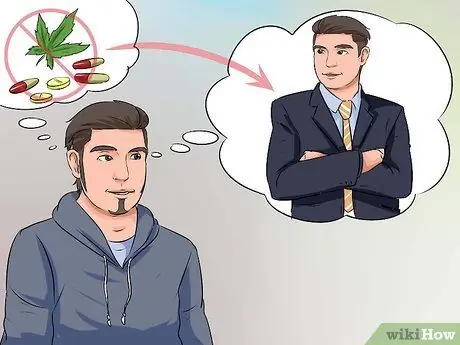
Step 1. Set goals for yourself
Studies show that goals (and the people who support those goals) can help reduce the likelihood of taking drugs. This is because goals encourage you to think about what kind of future you want and what you have to do to get there. On the other hand, taking drugs brings about a momentary feeling of "goodness," regardless of its future impact.
- If you are tempted to try drugs, even just once, think about how they will affect your future goals. How can you achieve your goals if you depend on illegal and/or expensive drugs, are jailed or have a criminal record for using them?
- Setting goals also helps increase self-confidence. When you believe in yourself and your ability to achieve what you set out to do, you are less likely to want to try drugs.
- Setting and achieving goals is also important for quitting drugs. This exercise shows that you can achieve your goals, including quitting your addiction.
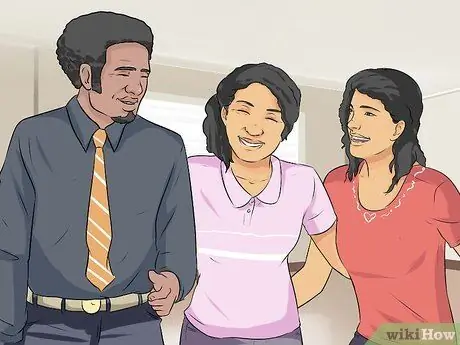
Step 2. Spend time with loved ones
Strong relationships with family and loved ones are a protective factor against drug use. In other words, strong relationships with family and friends will make you less likely to succumb to temptation.
If you feel pressured or curious about taking drugs, don't keep it to yourself. Talk to people you know, trust, and respect. Others can offer advice and support that is essential to living a drug-free life
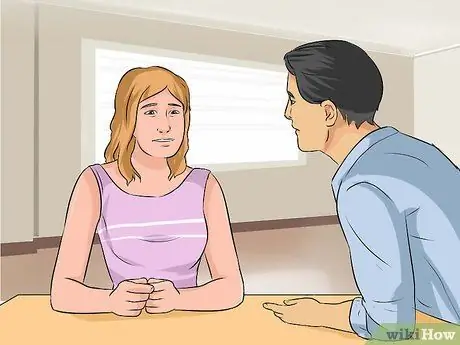
Step 3. Talk about what's going on
If you continue to feel pressured, even forced, to try drugs, talk to an older or more knowledgeable person, such as a parent, teacher, or counselor. You don't have to face the pressure yourself. Support from others will help you resist temptation.
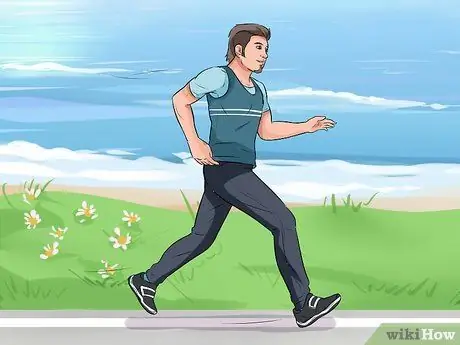
Step 4. Do something else that makes you feel good
If you are tempted to use drugs because you want to feel good, take your focus off the drugs by doing other activities that are fun and enjoyable.
- For example, find a hobby, laugh more with friends, play video games, or help other people feel better. It will help you find new meaning in life..
- Run, read a novel, talk to friends and family, play video games, or try to actively resolve your problems and negative thoughts by seeking counseling.
- Talk about your feelings with friends or engage in a distracting activity like going to the movies.
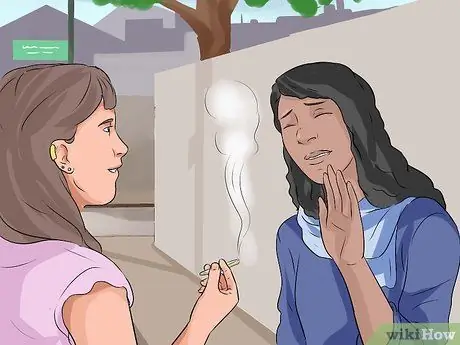
Step 5. Stop before you start
If you are offered drugs, refuse and walk away. If you're afraid of being pressured by your own friends, realize that real friends will appreciate it if you decide to say no to drugs, and they won't push you to do something you don't want to do. If they insist, consider finding another friend.
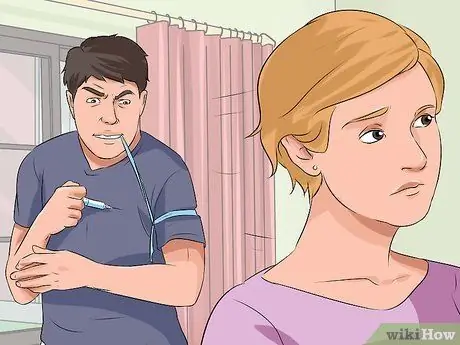
Step 6. Keep your distance
If you see a family member or friend taking drugs, stay away from them and don't follow in their footsteps. If you can, talk to trusted adults who can offer guidance or social support. The support system sometimes has an important role in a person's success in achieving and maintaining a drug-free lifestyle.
- Realize that the risk of drug addiction may run in the family, so if anyone in your family is addicted to drugs, be aware that you may be more vulnerable and should work hard to break free.
- If you have friends who use drugs actively, make new friends. Fill your life with people who don't do drugs and who think staying sane is a better way to live. Teens are usually more likely to dabble in drugs if their friends use them.
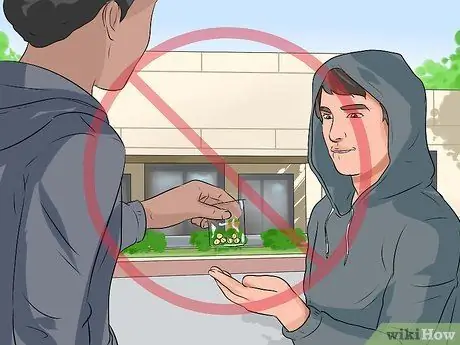
Step 7. Avoid temptation
If there is a certain group of people at school who are notorious for using drugs, don't hang out with them. You can find new friends who are interested in more productive behavior.
- If you are at a party and notice that there are drugs there, leave the party. Pressure from friends can melt you, even if you're sure you can resist.
- Realize that social influences are powerful and amplify the effects of the temptation to use drugs. In fact, social media can influence drug use. If you see lots of photos of drug use on social media, also consider blocking the source of that influence.
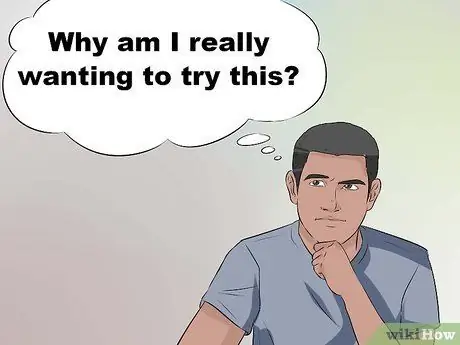
Step 8. Reflect on the temptation you feel
If you're tempted to try drugs on your own, for example, because you want to know what it's like to experiment with friends or family's belongings, you can work around that too. Think, “Why do I really want to try it?” What are your reasons for wanting to try drugs?
- If the reason is that you think everyone is doing it and you don't want to miss out on your friends, remind yourself that not everyone does drugs. In fact, drug use is generally declining among young people. There are many other, more powerful and healthy ways to bond with friends, such as pursuing a hobby or sport together.
- If your reason is stress or depression, know that taking drugs can relieve stress, but it's very unhealthy. There are other better ways to deal with stress, such as exercise, yoga, and meditation. If you are feeling very stressed, talking to a therapist can also help.
- Remember that your decision-making abilities are not fully mature if you are a teenager. Choosing to take drugs is a decision that can haunt you for life. Are you 50 years old will be grateful for the decision to try drugs?
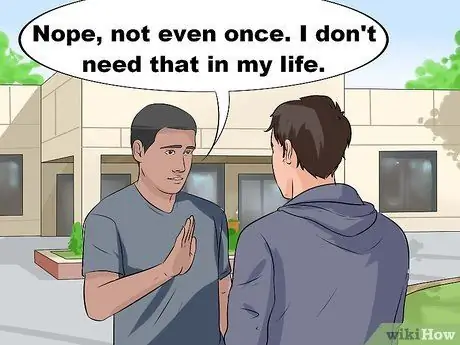
Step 9. Reject emphatically
There may be times when you are offered to try drugs. Answer firmly and don't hesitate. If you are in doubt, you open the door to pressure.
- If the person offering the drug asks why you don't want it, you don't have to give a reason. Just say that you are not a drug user. If you give reasons, you will open the door for further conversation, and then he may try to persuade you to try.
- There may be people who try to change your mind by saying, "Everyone does drugs," or "Just once, it won't hurt." Don't falter. You could say that drug use has actually decreased among young people, so obviously not everyone is taking it, and you don't want to either. Or you could answer, “No, not even once. I don't need that."

Step 10. Get busy
Keep your mind sharp and be actively involved in the world around you. If you stay active, busy, and active, you won't have time to do drugs. Boredom can trigger drug use, so by avoiding boredom, you will avoid temptation.
You can learn a new language, find a hobby, learn to play a musical instrument, or volunteer in the community. This way, your life (and CV) will be richer and you stay away from drugs
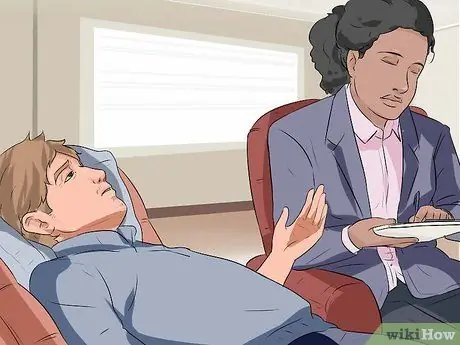
Step 11. Find out what makes you happy
Depression and low self-esteem can lead to drug use. If you are depressed, you should see a counselor to deal with it. Also, doing things that make you happy and maintain your self-esteem will make you less likely to take drugs.
Make a list of all the things that make you happy. Pick a few that are easy to do, like cooking an inexpensive meal or going to the movies, and make sure you enjoy these activities on a regular basis
Method 2 of 4: Quitting Drugs
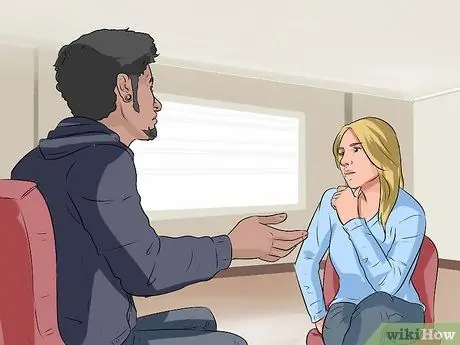
Step 1. Understand why people use drugs
People become addicted because drugs are calming. Then they get caught in a cycle of addiction because of addiction. The first step to becoming drug-free is confronting physical addiction by going to a clinic to participate in a program that helps with life-threatening addiction. Then, deal with the emotional problems that led to the decision to take drugs in an attempt to cover up the emotional pain.
- People who use drugs are not “bad” or “immoral” people.
- People who often use drugs can not just stop it. Drug addiction changes the brain in such a way that it is difficult-but not impossible-to quit.
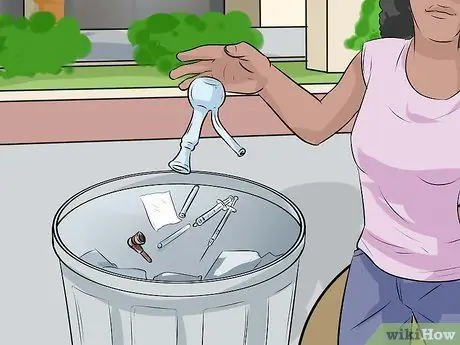
Step 2. Know your triggers
If you have ever used drugs, be aware of the triggers associated with using them. Maybe your trigger is a device for taking drugs, a group of friends, a specific location, or even a song you used to listen to while on drugs.
- If there are certain triggers that you know can cause problems and lead to drug use, get rid of them immediately. Erase songs from memory or throw away paper rolling marijuana. The chances of taking drugs will decrease if the trigger is permanently removed.
- You may also want to avoid places you frequent to do drugs. Staying away may be difficult, but it can help you break the habit.
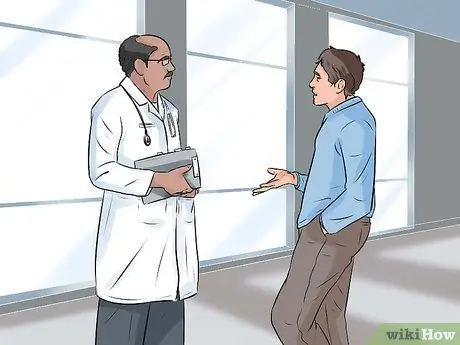
Step 3. Join a community or family-based recovery support system
Support is the key that not only comes into play when you want to dodge, but also stops. If you are struggling to live a drug-free life, a support group will help.
If you are interested in a support group, talk to a doctor, counselor, or other health care provider, check the phone book for local support groups, consult with a secular or religious community, or talk to a local or national group that specializes in helping addiction victims break free
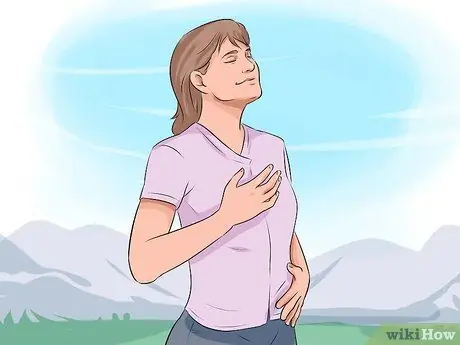
Step 4. Try Urge Surfing
Urge surfing is a mindful exercise that acknowledges your addiction and helps you relieve it. Imagine you are a surfer riding addiction like a wave until it breaks and becomes more docile, smaller, and easier to handle. Urge surfing is more effective than trying to ignore or suppress addiction.
- Keep in mind that this may not be the first time you've had an addiction. Has that feeling gone before? The answer is almost certainly yes. Remind yourself that even this time will pass. There are addictions, but you don't have to indulge.
- Pay attention to the thoughts and sensations you experience while craving drugs. For example, there may be a strong feeling that you want to take your preferred drug. Maybe you feel sweaty or itchy, or restless. Admit that you are addicted. Remind yourself that it's just thoughts that have no power over you.
- Focus on deep breathing when dealing with addiction. Breathe deeply and regularly. This will help direct your attention to the present moment instead of focusing on the addiction.
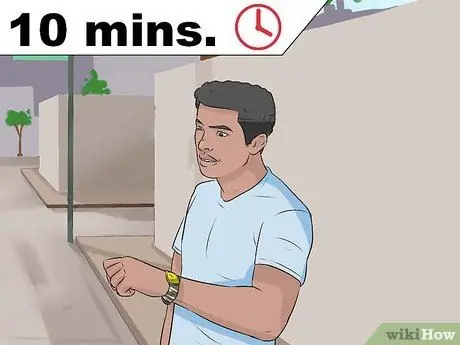
Step 5. Tell yourself that you will wait 10 minutes
If you feel a very strong urge to take drugs, delay it by reassuring yourself that you will wait another 10 minutes. Only 10 minutes. You can do it. When the 10 minutes have passed and the urge is still strong, say that you will wait another 10 minutes. Keep procrastinating until the urge passes. Eventually, the urge will definitely go away.
Method 3 of 4: Keeping Your Body Healthy
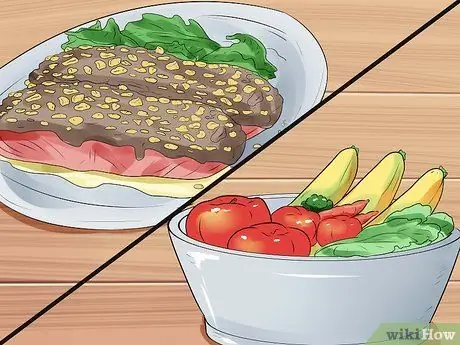
Step 1. Eat healthy foods
The mind and body are connected because the mind is composed of the complex functions of the brain, biological organs and other parts of the body. This means that mental health and physical health are closely related. Because poor mental health is associated with drug use and because mental and physical health are interrelated, maintaining a healthy body is an important part of living a drug-free life. One way to maintain a healthy body is to eat healthy foods.
Choose natural foods such as lean meats, nuts, fruit and vegetables. Who knows, you might find a passion for cooking that will build self-esteem and become a hobby that keeps you off drugs
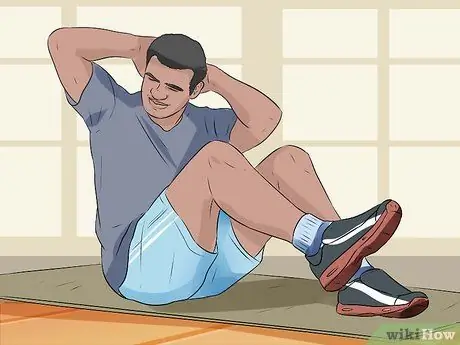
Step 2. Get used to exercise
Exercise can release feel-good endorphins in a much healthier way than taking drugs. Exercise helps reduce stress and also fights mild cases of depression. Stress and depression increase the risk of drug use, so exercise is important to help you stay away from it.
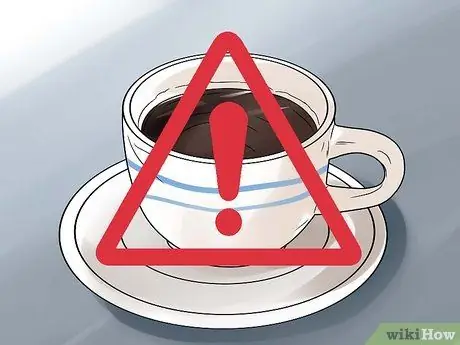
Step 3. Avoid excessive caffeine consumption
Consuming too much caffeine creates feelings of nervousness and restlessness that contribute to stress and make you more likely to take (other) drugs to combat the anxiety that caffeine produces.
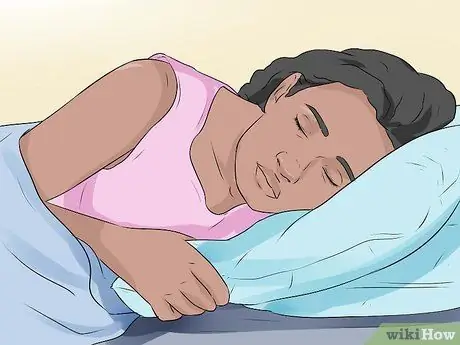
Step 4. Get enough sleep
Lack of sleep contributes to poor mental health because it causes feelings of tiredness, sadness, and anxiety that increase the likelihood that you will use drugs to make you feel better.
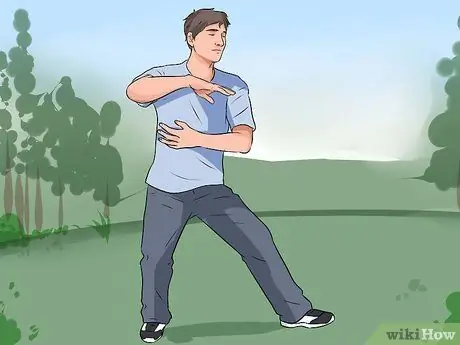
Step 5. Relax body and mind
Use relaxation techniques to keep you physically and mentally healthy. Relaxation techniques reduce the impact of stress on the body by counteracting negative feelings and negative bodily sensations such as muscle tension. Stress is the main reason people start taking drugs, so managing stress will help you break free.
- Try visualization. This technique involves the formation of peaceful and calming mental images. For example, picture a calm ocean and try to imagine it with all your senses. Think about what it smells like and how the wind and sun feel on your skin. Immerse yourself completely in the imagination.
- Try calming exercises, such as yoga or tai chi.
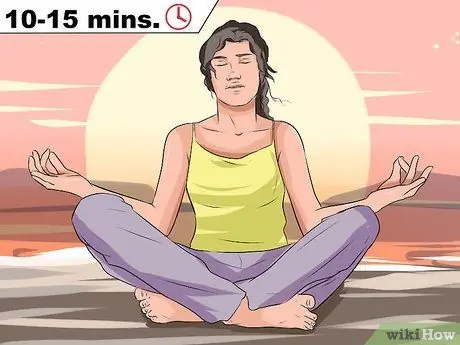
Step 6. Try meditating
Meditation is a great way to manage stress and focus on your breathing and body sensitivity. Meditate to calm yourself when you face the urge to drink or use drugs. People who regularly meditate tend to have a higher success rate for living drug-free in the long term.
- Find a quiet, comfortable place to sit for 10-15 minutes.
- Focus on breathing, take deep, regular breaths.
- When thoughts come to your mind, let them go without judgment. Return attention to the breath.
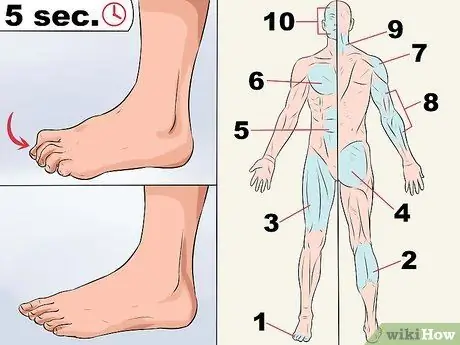
Step 7. Try progressive muscle relaxation
This technique helps you to know the difference between tense muscles and relaxed muscles. In this exercise, each muscle group is tensed before relaxing again. This will help illustrate the difference between tense and relaxed muscles and distract you from stress.
Start with the toes. Clench your toes as tightly as you can for 5 seconds, then relax for 5 seconds. Notice the sensation of relaxation. Continue to the upper muscles starting from the calves, thighs, buttocks, stomach, chest, shoulders, arms, neck, and face
Method 4 of 4: Seeking Treatment
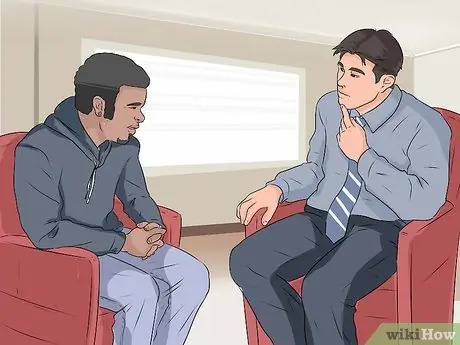
Step 1. Seek counselling
People who are trying to recover from addiction need guidance and care. Counseling can offer you the support you need to live a drug-free life while trying to quit or in recovery.
- Behavioral treatments, such as cognitive behavioral therapy, are very effective at helping drug users overcome addiction and stop use.
- Family therapy can also be helpful, especially if family dysfunction is causing drug use.
- Contingency management uses positive reinforcement, such as a reward, when successfully abstaining from drugs.
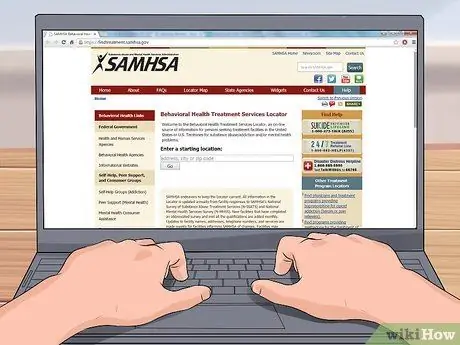
Step 2. Consider getting into a detox facility
Both inpatient and outpatient facilities have their own advantages and disadvantages. The inpatient facility allows close monitoring, eliminates the potential for drug use, and the detox process is quite fast. However, it is quite expensive and limits other activities, such as work. Outpatient facilities are lower in cost and have little impact on the patient's life, but may not be as effective as inpatients because of the possibility of access to drugs because the patient is outside the facility. The advantages are that it does not interfere with the patient's life and is cheaper. The best setting depends on a variety of factors, including the drugs used, the amount of use and duration of use, the patient's age, and any accompanying medical and/or psychiatric conditions.
- To find information about drug rehabilitation centers, visit
- People with serious drug problems, a long history of use, involvement in criminal activity, or difficulties in social functioning due to drugs are usually assisted by residential treatment at a detox facility.
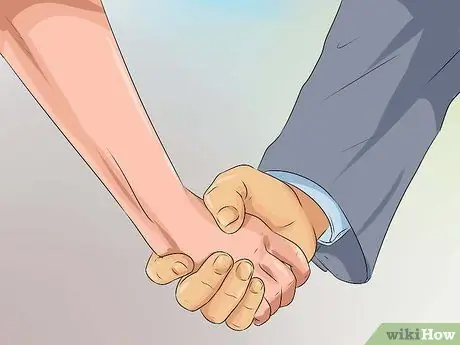
Step 3. Find sponsors
There are support groups that provide sponsorship to new members. The sponsor is a recovered addict and will help you through the steps of the recovery program. A good sponsor will:
- help you grow, be more productive, by your definition.
- helps you become more independent, more self-loving, more passionate, less sensitive, more free to control your own life.
- not support or be with you if you are not making progress.
Tips
- Talk to a trusted person who will understand and help you avoid it.
- If you have a drug problem, talk to a counselor, or consider joining a support group.
- Never use drugs. There are drugs that are also considered drugs, but do not harm you.
- Don't be afraid to say "NO" when offered drugs or alcohol.
- Increase your knowledge of drugs. Knowing the possible risks is half the battle.






